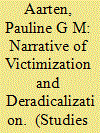| Srl | Item |
| 1 |
ID:
160519


|
|
|
|
|
| Summary/Abstract |
Narrative is intimately connected to victimization and radicalization. Trouble, the notion that drives narrative, is often coupled with victimization: the experience of suffering intentional harm. This experience can play a turning point in the stories that radicals construct about their own lives and thus play a role in their pathway to radicalization. In this article, three main themes of narrative will be further explored in relation to victimization and radicalization: identity, emotions, and culture. Central in this article is the discussion on how narrative can contribute to theory and research into victimological processes in radicalization, while offering new means to further develop key constructs.
|
|
|
|
|
|
|
|
|
|
|
|
|
|
|
|
| 2 |
ID:
160520


|
|
|
|
|
| Summary/Abstract |
While the study of victimology and radicalization mainly focuses on those who suffered from terrorist attacks, this article explores the role of victimological processes in deradicalization. Experts from different international deradicalization initiatives were interviewed. Using the narrative framework with its three key concepts—identity, emotion, and culture—as set forth by Pemberton and Aarten in this issue, the relationship between victimization and deradicalization is more thoroughly examined. Key findings include the delicacy of the term “victim” in radicals' narrative identity, the power of narrative in triggering and transmitting emotions, and the importance of a former radical that acknowledges the narratives of the radical and offers alternative narratives to their radicalized ideologies.
|
|
|
|
|
|
|
|
|
|
|
|
|
|
|
|